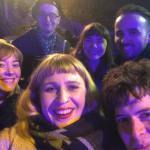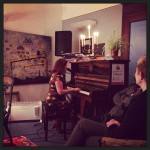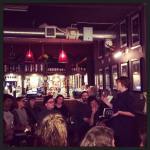Jan Carson's Blog, page 6
March 10, 2018
Talented Friends: Kelly McCaughrain
[image error]
This time tomorrow evening my good friend, Kelly McCaughrain will be launching her debut novel, “Flying Tips for Flightless Birds,” to a packed house at the Crescent Arts Centre. (Nb. if you’re reading this blog on Saturday night -10th March- [and I’m guessing you’re probably not, because most normal people aren’t at home blogging, and catching up on their medical dramas, on a Saturday night, they’re out doing fun, social things with other normal people], then you can still make the launch 7:30pm Sunday evening). They’ll be mad ukulele music, wine, circus-themed everything and a glowing, though not particularly eloquent, introduction from me. It’s going to be a great, big, noisy celebration, and so it should be. This book deserves a thoroughly joyful launch, because it’s a thoroughly joyful wee read.
I’ve known Kelly for about four years now. I first met her at a strange knitting and book-themed event in a cellist’s back garden. I’m allowed to say it was strange, because it was my event; one of those Jan-specials where the pun comes before the concept of what exactly the event will entail. Literary Knittery was the name and though I didn’t manage to produce a single line of knitting, I do recall great buns and meeting Kelly and her husband, Michael, (who was equally shit at knitting). We’ve been good friends ever since, meeting regularly at literary events and later, just because we enjoyed each other’s company, to talk books: the reading, writing and oftentimes, not-writing of books. Kelly’s one of the first people I go to when I write myself into a corner and want to throw my laptop in the bin and do something which doesn’t involve words for a change. She’s always calm. She’s always wise. She’s always honest about her own journey with writing. I usually leave our chats feeling like I might just go and hoke my laptop out of the bin and have another stab at whatever story I’m currently suffocating in. She’s been such a welcome addition to my community of friends who also write, I’m thinking of running another Literary Knittery, just to see who else I might meet.
[image error]
For as long as I’ve known Kelly she’s been working on a Young Adult novel. It’s gone through several incarnations. It’s sometimes felt like publication day was many million light years aways. A number of times, usually over wine, Kelly’s questioned whether it would every be finished. But she’s always kept moving slowly and steadily towards finishing her book. And, I’m so glad she has. I’ll say a little more about the actual novel in a second, but for now, I’d like to commend Kelly for keeping on, keeping on. This month I’ve blogged about two different dear friends releasing debut books. Both have been hard fought publications, involving long writing journeys. Five years. Ten years. Dear only knows how many years? Sometimes we lose track of how long we’ve been working on a project. But I think it’s important to celebrate perseverance and the sort of dedication to craft, which a writer like Kelly exhibits: spending time with a manuscript, allowing it to breath and grow, to refine itself with every subsequent edit, to get a book as close to perfect as possible, before releasing it into the world. I have a tendency to rush, in life and in writing, but I’m learning from people like Kelly to slow down and stay focused and not give up on a story just because it feels a little bit too much like hard work. I remember hearing George Saunders talk about the sixteen years he spent writing and rewriting a single short story. Later I read the short story in question and was almost instantly able to see where time had matured and honed it to something akin to perfection.
So, I’m particularly proud and honoured to be have a small role in celebrating the launch of “Flying Lessons for Flightless Birds,” tomorrow evening. I don’t read a lot of YA fiction. I’m not a young adult anymore, I’m just a regular adult now, perhaps even edging on the boundaries of older adulthood. However, I enjoyed this book. I don’t think it’s just a YA book. It has an appeal beyond its demographic. I loved its vibrancy. The colour and joy which leaks out of the characters as they talk about growing up outside the boundaries of normal Northern Irish life in a circus school. It made me wonder why we haven’t more Northern Irish books like this, telling the stories of the marginalised and incredibly intriguing people who call this wee corner of the world, home. I enjoyed the book’s honesty. The way it wrestles with issues around gender, sexuality and acceptance. the characters are so beautifully and believably written, I was right there beside them, through the highs and the undeniably low lows of their journey. Don’t be fooled by the bright cover, or the fact that Roddy Doyle’s called this book “sparkly.” It’s not just fun and froth. It packs a fair punch too. There are sections demand empathy with characters who are journeying through some truly devastating experiences. And while, it’s not the sort of book I’d usually read, if I had children in the early teens bracket, I’d definitely be buying them a copy, and probably stealing that copy for a sneaky wee reading session of my own, because “Flying Lessons,” is more than just a book about teenagers learning how to become functional adults. It’s a book about deciding that you’re ok being yourself no matter how strange, or outlandish you may be. I’m nearly forty and that’s something I need reminded of on an almost daily basis. Hats off to Kelly. Tomorrow night’s the first of many, many book launches to come.
February 26, 2018
Talented Friends – Apricot Irving
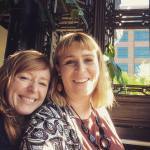
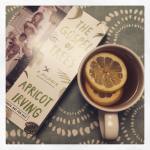
When I first moved to the States in 2005 one of my chief aims was to acquire some friends with interesting names. Growing up in Northern Ireland in the 1980s I knew more than my fair share of sensibly-named Stephens, Claires, Catherine and Andys. I was in the market for some friends with exotic names. I had visions of returning to Ballymena to recount anecdotes populated with people who sounded like they might be lifted from an episode of My So Called Life. Within weeks of arriving in Portland I’d met a Tabitha, a Vandoren, Nate Grubbs, (who remains my best-named friend of all time) and a bunch of other friends who weren’t called after dead relatives or Biblical characters. Most of them made their way into the cast list of my first novel. The rest are just waiting to pop up in future stories.
I have to be honest and say that my first impression of the superbly-named Apricot Anderson Irving was entirely linguistic. I was a little jealous of the way her name ran off the tongue. I remember thinking, “that sounds like a writer’s name.” I could picture it written on the spine of a book. And sure enough, Apricot was a writer, even back then she was beginning to work on a book focused upon her family’s experience, living as missionaries in Haiti during the 80s and 90s. I was just starting to write stories. They weren’t very good. I remember Apricot being one of the first people to encourage me in my writing. I really took her encouragement to heart. I also remember being a little in awe of the way she could weave such gently magic with her words.
Portland was more than ten years ago. I still miss it sometimes. Mostly I miss the community of people I knew back then. Every so often I return to spend a fortune in Powell’s City of Books and walk up and down Hawthorne Boulevard breathing in the early evening smell of hot beer and patchouli. I try not to leave it too long between visits. Last October I managed to squeeze in five Portland days between book festivals and it was such a treat to meet Apricot in the Chinese gardens, to drink tiny bowls of petal-infused tea and catch up with each other’s lives. A lot has changed in ten years. Children. Books. Travel. Jobs. We lost track of time and when I realised I was almost an hour late for my next meet up, I had to leave in something of a rush. On the way out of the tea room, Apricot kindly gave me a proof of her book, The Gospel of Trees. It’s always something of a miracle to hold a friend’s book. To have talked about it and lived with it through the process of creation and finally be able to feel the weight of it in your hands. I’m very fortunate. I’ve shared in so many friend’s book births. But this one was special. It was a long time coming, and I knew what it had cost.
I finally got to sit down with The Gospel of Trees last week. I was floored by a nasty cold and stuck indoors for days. It was the perfect excuse to spend time with Apricot’s book. It’s the kind of book which requires time. This is the sort of read which, like Marilynne Robinson or Wendell Berry, forces you to slow down to a kind of earthy pace. Apricot’s writing is so tied to season and landscape and the small details of the natural world, it refuses to rush. Each sentence is perfectly crafted and incredibly evocative. It’s impossible not to imagine the sounds, the smells and vivid, searing images of Haiti she conjures up in her writing. It might have been the cold medicine I was taking, but for three straight nights I dreamt of the landscapes Apricot describes, though I’ve never been to Haiti. The Gospel of Trees is a memoir rooted in place. A love song to Haiti, but a very honest, warts and all kind of love song. Compelling as I found this book, it wasn’t the easiest of reads.
I finished reading The Gospel of Trees on Saturday evening. I stayed in with a glass of wine and read the last 150 pages in one sitting. I didn’t grow up on the mission field but so many parts of Apricot’s story -her honest wrestling with both the beauty and the hypocrisy of religion- struck so close to my own story, I found myself crying over several of the passages. Apricot did not set out to write a defence of the missionary influence in Haiti. Neither did she set out to write a sweeping critique. This is an incredibly measured book which bravely tells a difficult story with painstaking honesty, even when such honesty involves questioning her own actions and motivations. Essentially this is a story of white, Western Christianity and its mostly well-intentioned, but oftentimes blundering attempts to embrace another culture. Damage is done, but so is good. No one character is entirely saintly or thoroughly villainous. Apricot is both thankful and deeply saddened by her childhood experiences. By the book’s end I was a muddle of mixed emotions, unsure who to point the finger at, or whether there was any point at all in laying blame. In the end I left resonating with a beautiful quote Apricot has included in the closing chapters of her book, “If you have come to help me,” writes Indigenous Australian artist and activist Lilla Watson, “then you are wasting your time. But if you have come because your liberation is bound up in mine then let us work together.”
I’m on my own personal journey with faith, religion and all the things I’ve inherited from Northern Irish Protestantism. It’s nothing like the legacy of having lived in early 90s Haiti, but sometimes it can feel like a very long and lonely walk. I don’t know if this is a tensions which will eventually resolve or something I’ll journey with for the rest of my life. I have my suspicions it’s the latter. I am thankful for Apricot and for books like The Gospel of Trees which don’t feel like they are screaming at me, arguing for one polemic or the other, forcing me to draw lines and take sides. This, for me, was a book which felt like a long, deep sigh, both weary and also full of relief. This is a book which seems to say we might not know what everything means or how to answer all life’s big questions, but at least we can be honest with each other. More than anything this is a book which made me want to continue wrestling with the difficult stuff. The hard art of holding on to what is good and true, of being able to let go of hurt and hypocrisy. The practice of remaining in relationship with other broken people, knowing you’re essentially flawed yourself. The freedom that comes with total honesty. And so I’m grateful to Apricot for her friendship and encouragement. And I hope we have many more long bookish conversations to come. And I am thankful for all the years she poured into this book, because I know I won’t be the only person who moves a little closer to liberation, through reading it.
February 13, 2018
A Roaming I Will Go
[image error]
Tomorrow I begin my stint as a Roaming Writer on the trains of Ireland. I’m very grateful to the Irish Writers Centre for making this project possible and to Translink and Irish Rail for their generous support. Lots of you have asked what a Roaming Writer on a train actually does so I thought I’d write a quick blog to let you know what I’ll be up to and how you can get involved.
Sadly, I will not be driving any trains. Neither will I be spending the next three months sleeping in boxcars/in the mail carriage like a latter day version of Woody Guthrie. I don’t think I’m even going to get a train conductor uniform. However, I will be making train journeys across Ireland, (both North and South), chatting to fellow passengers and staff members and writing Postcard Stories inspired by my journeys and the people I meet. I’ll also be teaching writing workshops with creative writing students at a handful of different universities throughout Ireland so they can contribute their own stories to the project. I can’t wait to get started.
I’d love for all you to get involved in this adventure. I’ll be posting details of the trains I’ll be on, on my twitter feed @jancarson7280 or you can follow the Irish Writers Centre for the same information, (and fantastic up-to-date news of opportunities for writers) @IrishWritersCtr If you or someone you know happen to be on one of my trains please come find me and tell me a little about your journey. I’ll be writing individual, bespoke Postcard Stories for the people I meet. Everyone who shares a story with me will get one of these mailed out to them. I’ll also be posting my tiny stories on our Instagram feed @roamingwriterstories You can follow me there to read all the stories I write during the project.
If we’ve never met, this is what I look like, (see above), though I’ll most likely not wear the same outfit for the whole three months. I’m really looking forward to meeting lots of you and hearing your stories. Let the roaming begin.
I’ll be on the 10:20 train from Belfast Central tomorrow morning, (February 14th) traveling to Derry and returning on the 14:38.
February 8, 2018
What Am I Doing? What Am I ‘Not’ Doing?
[image error]
You may have noticed that I haven’t blogged in quite some time. Maybe you didn’t. That’s ok too. I am not hibernating, though it’s been so cold in East Belfast, the idea of disappearing under my duvet with a bar of Caramac and re-emerging in May, seems infinitely appealing. In fact, I’ve been “enjoying” the busiest January/February of my young life. I thought I’d write a quick blog just to let you all know why I seem to have disappeared/look like the the world’s grumpiest individual and try to get away from you really quickly every time our paths cross.
At last count I am currently working seven part time jobs/longterm art projects. I’m not complaining. It’s wonderful to have this much work and as a result it looks like I’ll be able to keep myself well-stocked in Caramacs and other more necessary items for the foreseeable future. All my projects are wonderful and important and life-giving in their own ways, and it is such a blessing to be able to say I enjoy what I do and actually mean it. But oh my goodness, I am so tired. I am so tired/busy that I didn’t get to watch the new episode of Endeavour until three whole days after it aired. (Not good enough, Jan. Next thing you know, you’ll be skipping Casualty). I am also leaving important items lying at my backside in coffee shops at an even more impressive rate than usual. (This is always a good means of monitoring my overall well-being).
I am beginning to learn lots of hard lessons about being a freelance arts practitioner. For example. Be careful who you give your phone number to. And. It is impossible to function if you only eat workshop biscuits all day. And. Four hours per week commitment, rarely means four hours. It’s a bit like the 10% extra you get on top of the speed limit, before you get a ticket. Hire a freelancer for 4 hours a week and they’ll probably do up to 6 hours before they start complaining. I am not at all good at complaining. I have also learned that I am not very good at measuring things such as how long a project will actually take to deliver and how much I should charge for things, (Nb. saying, “I don’t know, how much do you think you should pay me?” is only a good option when working in the arts sector in Scandinavia), and how many extra minutes/hours/Millenia you need to set aside between meetings when your meeting is in the Queen’s area and you require a parking spot in the Holy Lands. It’s a steep learning curve. I hope to get better at it all soon.
For those of you thinking, “seriously, Jan, seven part time jobs? You must be exaggerating,” (most likely it is only my brother wondering this, or my nephew, who has learnt from my brother, to question my use of hyperbole), I am currently curating three literary festivals, teaching a radio drama workshop for carers, overseeing the Dementia Friendly film programme at the QFT, facilitating a film making project for seniors, coordinating the Literary Programme for CAP and, as of last week, roaming about on trains all over Ireland, writing stories inspired by my journey as part of the Irish Writers’ Centre’s Roaming Writers programming, (bit of a tongue twister that one). Actually just counted up there and that makes eight, rather than seven responsibilities and doesn’t even take in all the one off workshops and speaking dates and sundry bits and bobs I find myself agreeing to do, (German documentaries about Brexit and the like). Every one of these projects is incredibly important and mostly a lot of fun, but right now they’re taking up such a large chunk of my time and I’ve become something of a hermit.
I’m also in the middle of a big edit of a new novel. It will be launched sometime in early 2019 and I’m delighted to say it’s found a really wonderful publishing home, though I can’t say too much more at this stage. Editing isn’t really my favourite part of the writing process. It feels a little like doing an enormous jigsaw puzzle where the frame keeps expanding with every piece you put in place. I’m inclined to just ok all my -very lovely-editor’s suggestions in track changes, shuffle the chapters around a bit and say, “there you go, all done. It’s meant to be confusing. I was going for a kind of Finnegan’s Wake vibe.” I’m not doing that. They probably wouldn’t publish it then. Instead I’m drinking lots of coffee and staying up late and meticulously going through the whole bloody thing for the ninth time, trying to get it as good as it can possibly be. It is not very much fun.
I anticipate re-entering civilisation around the middle of March. If you don’t see me by April, it might be best to break my door down. You’ll probably find me sitting in a circle of Caramac wrappers, furiously trying to work out what tense it is when you’re in the past already but you’re trying to talk about something that happened before that. Please don’t have too much fun without me. I’m not gone. I’m just editing.
January 4, 2018
Postcards for Hannah Instalment Five
[image error]
25th December 2017
Ballymena
Salvador Dali, attired in a deep-sea diving suit, once gave a lecture about a philosophy student who, over a six month period, ate an entire wardrobe, including the mirror. Anything, this lecture implied, could be eaten if consumed in small enough mouthfuls. Which leads you to wonder how a car might be eaten, or a large suspension bridge, or even a skyscraper. Each plug socket, each pane of strengthened glass, each steel girder, doorframe and carpet tile, if reduced to a morsel no bigger than a child’s marble, might pass easily through the mouth, the throat, the stomach, large and small intestines. The human body would naturally retain those elements useful for sustenance and, after some time, repel that which proved useless, in the usual manner. It would take a century, maybe two to consume something as colossal as a skyscraper. It would be hard on the teeth; harder still on the tender lining of the guts.
You understand what Dali is trying to say with his wardrobe schtick. There are no real limits to human consumption. If a wardrobe can be ingested, one ugly mouthful at a time, then there’s no idea so big or insidious, some idiot won’t open his mouth and swallow it whole.
26th December 2017
Ballymena
A hundred thousand cats have gathered in the Cats’ Banqueting Suite. The noise of them is like the sound of a hundred thousand extractor fans just switched off and purring their way back to silence. The hundred thousand cats have been confused by the signage on the Cats’ Banqueting Suite. Are they to eat in this room, or be eaten? It all comes down to where you place the emphasis. The hundred thousand cats do not want to be eaten but they are still cats and therefore incapable of resisting the offer of a free meal. There is something of an atmosphere building in the Cats’ Banqueting Suite.
“Better to eat than be eaten,” says one fat tabby who is crouched behind the buffet table and, as there is nothing in the Cats’ Banqueting Suite to eat –no sausages, ham or potted fish- nothing except a hundred thousand mewling cats, he sinks his teeth into the tail of the cat in front, who hisses, “so that’s what we’ve come to?” and starts into his neighbour’s hind leg. Before very long every cat in the Cats’ Banqueting Suite is joined together like a long and writhing, furry necklace, or a scene from a Leonora Carrington story where things, (mostly cats and horses), are always eating other things, (occasionally wolves and birds), to show that misogyny is bad.
None of the hundred thousand cats in the Cats’ Banqueting Suite have read Leonora Carrington, or seen any of her surrealist paintings. Neither have any of them eaten cat before, but the taste of it is delicious, like raw chicken, or mouse, or the inside of their own pink mouths.
1st January 2018
Newcastle
To steal a story from Hera Lindsay Bird who begins things but never quite gets round to completing them. Please picture a library of some standing, not quite as grand as the British Library, but larger in scope and size than the Linenhall. Imagine then a small fire flaring in the lower left corner of the fiction section. This fire is contained within a wastepaper bin, or woman’s handbag. It is entirely accidental, the product of a dropped cigarette or incendiary idea which has slipped from the mind of a passing writer, like a tissue improperly tucked into a sweater cuff. This fire must of course be accidental for it is beyond any of us sensible beings to imagine a book fire started purposefully with malicious intent.
See the fire swoop through the fiction section in an orderly, alphabetical fashion, consuming Austen, Atwood, Borges and Michael Chabon, (who wrote Wonder Boys and Kavalier and Clay and several other novels which aren’t quite as good). Finally imagine the firefighters arriving somewhere about L or M to stop the fire’s alphabetical spread. Of course the adjoining letters, (N, O, P), would most likely be lost to fire or water damage, but half the world’s stories would still be left. And we’d continue to read George Saunders, and William Trevor, Virginia Wolff and Kurt Vonnegut, who’d no doubt have wise things to say about fires and loss and the startling things which often emerge from the ashes.
2nd January 2018
Seven Stories, Newcastle
There are two old-fashioned, stuffed and jointed teddy bears encased in a glass display case next to the fire exit. They originally belonged to two sisters –Elizabeth and Jean Gilmour- and were purchased in Leeds market on the occasion of each girl’s birth, (1906 and 1909, respectively). Teddy is wearing a knitted sweater. Bruin, striped pyjamas and a fetching burgundy scarf. Teddy has both hands raised in the air as if overjoyed, or caught in the act of performing a star jump. Note their black button eyes, their hand-stitched noses, the way their pointed snouts have begun to fall back into their faces where the straw has worn thin. Still, they look pretty fresh for 110. And this has nothing to with being kept behind glass. These bears have been loved. These bears couldn’t be happier. Here they are, united in their dotage, and grinning, albeit a little lopsidedly. Both their owners are long dead. But, understanding bears better than most adults, they have left strict instructions for Teddy and Bruin to be housed, together, in the Children’s Museum. So, here they are now stuffed and placid, content to do what all good bears are born to do- make their children smile.
3rd January 2018
The Laing Art Gallery, Newcastle
Gallery Notes on “Study for ‘The Unknown.’” Oil on canvas. John Charles Dollman. (1912)
Note the topless lady kneeling in front of a small campfire, her legs encased in what appears to be a picnic rug. Note her right hand raised and pointed towards the horizon, possibly in warning, and the floral, bathing cap perched on her head. Isn’t she graceful? Isn’t she oh so very exotic?
Note the eight chimpanzees circled round her in awe, the chimp on the far left giving her a look which might well be reverence or could, just as easily be, “what the Bloody Hell’s that lunatic on?” Note the ninth chimpanzee, back turned, already scuttling away across the desert. Is it a desert? Or a soft play area for children? It’s hard to tell.
Note the mythical lighting, the lady’s hair which is styled like Cleopatra’s hair in paintings, the heavy gilt frame they’ve placed this painting in.
Ask yourself, which myth/legend/Biblical story this scene depicts. Rack your brain. Really concentrate hard. Ask the man standing next to you in the gallery. He is wearing a hat like Sherlock Holmes. He looks like he’d know his Greek-type shit. He doesn’t. Later, on Wikipedia, discover that there is no myth or legend called “Topless Lady and the Ring of Chimps.” Read that John Charles Dollman simply made the whole thing up. What a joker Dollman was! What a chimp!


January 1, 2018
Reading Books in 2017
[image error]
Here are the twenty books I enjoyed most in 2017. Sorry. That’s a lie. Some of these books I didn’t enjoy at all. They infuriated me. They demanded much of me. They lodged in the back of my head like raspberry seeds stuck between my teeth and would not go away. They made me think differently. They made me think better. They began great conversations with some people and ended conversations with others. They left me wanting to be a better, more fearless writer/activist/thinker/human being. In short,.they did exactly what good books are meant to do: each one of them destroyed me in its own peculiar way.
They weren’t all written in 2017. Hardly any of them were. Once again sorry. Not sorry at all. Have found myself increasingly irritated by all these best books of the year list. I’m competitive by nature. I get anxious when I think there are books out there which I should have read, and haven’t. I Am trying to teach myself how to read what I need, want and have to read when I need, want and have to read it. I’ve come to appreciate the way one book will signpost me towards the next. I like the idea of journeying through literature, letting the books suggest where and who I should focus my attention on next. This year I’m going to try and resist the desire to frantically read all the books I’m supposed to read, quickly before the next unmissable book is published. I’m going to read a lot of unfashionable books. I might even continue working my way through the Agatha Christies.
Like what you like folks and don’t be swayed by what everyone else is hailing as the best book ever. If a book’s actually as wonderful as the hype it’s generating it’ll be just as wonderful next year or ten year’s from now. I’m attempting to stop being a competitive reader so I can re-remember how to read for pleasure, challenge and sustenance. This will mean I read slower. It may mean buying fewer books and making my way slowly through the enormous pile of unread novels sitting beside my bed. I might re-read old friends. I might only re-read old friends. I’ll probably read fewer books and miss out on the books of the moment and won’t have any insightful things to say in literary discussions. I think I’m ok with this. I’ll probably get round to reading the best ones eventually. This year. Next year. Post-retirement. Who cares. The very best books always wait for you to catch up with them.
The Twenty Books I’m Carrying With Me Out Of2017
(In no particular order)
Luke Kennard- “The Transition”
Leontia Flynn – “These Days”
Max Wright – “Told in Gath”
Sara Baume – “A Line Made By Walking”
Margaret Atwood – “On Writers and Writing”
Jennifer Egan – “A Visit From The Goon Squad”
Phil Harrison -“The First Day”
Sarah Moss – “The Tidal Zone”
Joan Lindsay – “Picnic at Hanging Rock”
Edna O’Brien – “In the Forest”
Frankie McMillan – “My Mother and the Hungarians”
Rebecca Solnit – “The Faraway Nearby”
Ocean Vuong – “Night Sky with Exit Wounds”
Joanna Moorhead – “The Surreal Life of Leonora Carrington”
Ed. Paul Kingsnorth – “The World-Ending Fire: The Essential Wendell Berry.”
Sally Rooney – “Conversations with Friends.”
Donald Antrim – “Elect Mr Robinson for a Better World.”
Lucia Berlin – “A Manual for Cleaning Women”
Bonnie Nadzim – “Lions”
Ben Lerner – “The Hatred of Poetry”


December 30, 2017
2017 in Films
[image error]
I don’t think 2018 was a great year for films. The beginning of the year was clogged up with a lot of stodgy, overly long Oscar contenders, (Silence, Jackie, La La Land – clasps head in horror, remembering all those people dancing on top of cars in Benetton coloured dresses) There were far too many superhero movies. Kristen Stewart seemed to be in everything and there were a lot of very earnest movies about the War. I also watched nine musicals. This is approximately nine times as many musicals as I’ll usually watch in any given year. It is nine times more musicals than I had any desire to watch in 2017. BUT, (and it’s a very big but, and I still maintain that Seven Brides for Seven Brothers is one of the worst things my eyes have ever looked upon), several of the musicals did not cause me to to scream, “stop singing, just say it,”out loud, in the cinema, and a couple were actually pretty good, (but only the ones where the singing and dancing people were playing characters who are meant to be singers and dancers- clearly I have problems with the suspension of disbelief).
This was also the year that John Cusack came to visit us in Belfast. I will always remember Cusack’s visit to Belfast as I have a lovely copy of his book signed to Janice, (which is not what my name’s short for, or even close). John Cusack will always remember his visit to Belfast because he was driven all over the city for two straight days and then marvellously interviewed by Hugh Odling-Smee, (and nobody forgets meeting Hugh). 2017 was the year we started our Dementia Friendly Screenings at the QFT and while they have been mostly musical based, they have been an absolute joy and triumph, and quite frankly a bit of a cinematic education for me. I’m delighted that we’re going to be able to continue these screenings in 2018. Check out the QFT website for details. Everyone’s welcome, so long as you like classic cinema and custard creams.
I managed to watch 100 films in 2017. Around a dozen of these were long haul flight movies most of which were utter drivel, (Table 19, being the chief offender- what were you thinking Stephen Merchant? Clearly you weren’t thinking at all). I’ve picked my Top Ten here plus a stand out Number One which I’m pretty sure most people missed. Do your best to track it down, (as legally as possible). It’s one of the most stunning war movies I’ve ever seen. It will leave you exhausted in a good way. All the movies on my list are up there because they stuck with me long after I left the cinema. Some of them aren’t the easiest watches, or the most assured scripts, but they are, for the most part interesting and challenging and not starring Kristen Stewart.
I’ve left out some noteworthy films, (Loving, Prevenge, The Fits, Logan, the very beautifully shot, Frantz and the Disaster Artist), which are definitely also worth a look and, this year having been dominated by old movies, I’ve added a new list of top 5 classics I finally got round to watching in 2017. To be really honest if Being There had been released in 2017 it would have been my favourite movie of the year. It’s such a delight from start to finish. Here’s my lists and my annual plea to support your local, (only), independent arthouse cinema by getting yourself a QFT card, and becoming lovely, regular patrons of this esteemed venue. Here’s to 2018 and a, (hopefully), less stodgy run of Oscar contenders.
Jan’s Movie of the Year
Land of Mines
Top Ten New Releases (In no particular order)
20th Century Women
Get Out
Manchester by the Sea
Lady Macbeth
Dunkirk
I am not your Negro
Wind River
God’s Own Country
Paddington2
The Florida Project
Top Five Classic Movies (Shame on me for only seeing these now)
Being There
Night of the Hunter
Iris
The Straight Story
White Christmas


December 27, 2017
Thoughts at the End of a Long Year
[image error]
Let me begin with Wendell Berry, because Wendell Berry almost always says it better than anyone else,
“Nothing in my education or experience prepared me even to expect the horror and anxiety and moral bewilderment that I have felt during these years of racism and disintegration at home and a war of unprecedented violence and senselessness abroad. The attempt to keep meaning in one’s life at such a time is a continuous strain, and perhaps ultimately futile: there is undoubtedly a limit to how long private integrity can hold out in the face of, and within, public disintegration.”
Despite how this reads, Wendell Berry isn’t writing about the world in 2017. This is an extract from his essay, “Some Thoughts on Citizenship and Conscience in Honor of Don Pratt,” written in 1968 at the height of the Vietnam War. Berry couldn’t possibly have foreseen just how prophetic his words would seem in 2017. I’ve not read anything he’s written recently. I’m sure it’s just as wise and humble and a little bit vitriolic.
It’s been a horrible year to be a human being. The world seems out of control and every day things appear to be getting worse. It’s hard to know how to be alive right now. I was drawn to Berry’s thoughts on maintaining meaning in your private life when the public world seems to be disintegrating. I’m old enough to remember what it was like to occasionally wake with a feeling of general dread related to the day ahead, all the time knowing it was only your day which might be ruined by a visit to the dentist, or a difficult conversation, or a particularly horrible meeting. Your own personal experience of the day’s events would rarely resonate beyond your immediate area of influence. These days most of us wake already bracing ourselves against events and happenings so far beyond our influence it can seem like we must stand helpless on the sidelines whilst the world goes hurtling over a precipice.
I’m sure many of you, like me, often feel utterly helpless and isolated in the face of it all. It’s not that there aren’t things we can do, (I was also recently drawn to Iris Murdoch’s closing remarks in The Sea The Sea, “one can live quietly and try to do tiny good things and harm no one. I cannot think of any tiny good thing to do at the moment, but perhaps I shall think of one tomorrow,”), and I’m constantly humbled and inspired to be surrounded by so many incredible people who are trying to do tiny, (and not so tiny), good things, who serve the city I call home week in, week out, without proper recompense, who challenge the status quo through acts of generosity and creativity, who put their collective feet down and say, “NO,” loudly and with tremendous tenacity when dissent is the best option available. It is a lot easier to face the unknown future as part of such a bold community. (I know Wendell Berry would agree because community is the beating heart of all his teachings). But there’s a tension at the core of all this, a reality I’m not exactly sure what to do with, something I’ve been wanting to write about for a little while. Reading Wendell Berry has tipped me into actually pulling some thoughts together, so before the year ends, I thought I’d try to write this out.
I have had a really fantastic year. The world has not. I feel like I need to apologise for having a great year. I’m not sure if it’s ok to be personally happy while humanity as a whole is so rightfully miserable. It feels smug. It feels self-centred. It feels like something to be talked about in a dark corner, out of the side of your mouth, in a whisper. This time last year I was working a job I hated. I was living in a cold, rambly house which made me feel lonely every time I came home. I was writing books for no money, with no idea who was going to publish them. I was coasting on the edge of broke. In the last year I’ve left my horrible job and gone freelance. I’ve been involved in some of the most wonderful arts projects ever. I’ve moved into a house I love in a neighbourhood where I’ve felt genuinely welcomed and part of a creative and restorative community that constantly amazes me. I’ve found a great home for my next few books and a wonderful advocate for my writing in the lovely Kate Johnston, (agent extraordinaire). I finally have the space and resources to give my writing the time I’ve always wanted to give it and it feels great. I’ve met more than my fair share of amazing, inspiring people, been able to travel a little and, after decades in transit, hoak all my books out of storage and surround myself with them, (arranged in alphabetical order of course).
It’s been one of the best years ever and yet, in my head there is always a kind of separation taking place: personal life equals great, rest of the world equals going to Hell in a hand basket, (with increasing speed). How can you be both very very happy and very very sad at the same time, all the time? I don’t have any real answers for what should be done with this dichotomy and yet I was heartened to read Wendell Berry struggled, (and no doubt is struggling still), with the same issue. He writes later, in the same essay,
“That many are cold and the world is full of hate does not mean that one should stand in the snow for shame or refrain from making love. To refuse to admit decent and harmless pleasures freely into one’s own life is as wrong as to deny them to someone else. It impoverishes and darkens the world.”
I love this. It gives me hope that it is indeed possible to live well and honestly during difficult times. It reminds me of the best conversation I had in 2017. I was visiting an arts project in a Belfast-based nursing home and, over tea and buns, got talking to a very elderly lady who told me, with an enormous smile on her face, that she was going through a wee rough patch and I told her I was going through a wee rough patch too. She took my hand in hers and told me that if she’d learnt anything in her eighty something years on this planet about the meaning of life and all that sort of stuff, then it was this. “Just bring joy,” she said. “Don’t make it any more complicated than that.” Later, I’d find out that this lady’s, “wee rough patch,” was a terminal cancer diagnosis and I’m reasonably sure she’s not with us any more. The fact that she knew her personal circumstances were pretty dire and the world wasn’t looking great either and she was still, in her own words, bringing joy, is most definitely the most heartening and probably the wisest thing I encountered this year. I wish I had even half this woman’s courage. I continue to try.
So here’s to 2018. I’m already a bit terrified. And hopeful. But mostly terrified. Good things will happen. Bad things are already happening. But I think I’ll just try to bring joy and not make it any more complicated than that. Anything more feels a little beyond me right now. I’ll leave you with a few lines of Hera Lindsay Bird who pretty much says the same thing. She’s just better with line breaks than me.
“Oh let us not be little bitches to one another
Life is hard enough as it is
Life is hard enough and fast enough
And there is nothing in this world worth doing
But shaking our heads in awe.”


December 21, 2017
Postcard Stories for Hannah Instalment Four
[image error]
6th November 2017
Auckland, New Zealand
Gallery notes for wall-mounted piece by the New Zealand artist, John Pule.
Rendered in enamel, oils, pencil, pastel and ink on canvas this painting is entitled “Kehe tau hausaga foou,” which translates roughly as, “To All New Arrivals.” Spread across five large panels Pule uses the blue and white colour scheme often associated with Delft china to sketch hundreds of tiny details lifted from both contemporary and ancient culture. Here is Christ crucified and the decapitated head of Batman, nuclear weapons, futuristic jets and Maoiri carvings, enormous mythical beast and buildings. There is a lot going on in this painting. The only thing linking one detail to the next are Pule’s people who are always tiny, indefinitely sketched and dwarfed by life’s larger circumstances. It is as if the artist is saying all new arrivals are in the same boat as those who have always been present, all are little cogs in a much bigger machine. If you stand on the other side of the gallery and let your eye fall loose you can hardly even tell where one painted person ends and the next begins.
10th November 2017
Wellington, New Zealand
“To be alive and to be a writer is enough,” writes the Wellington-based short story writer Katherine Mansfield in her notebook. The year is 1917. Mansfield is both writing and alive. Here is a photograph of her, blunt fringed, bobbed, staring straight down the barrel of the camera. She looks ferocious. The resemblance to Flannery O’Connor is not so much uncanny as implicit. It’s in the haircut, of course, the shoulders back stance, the stoic refusal to do what everyone else is telling her to do. And, O’Connor said something very similar in her letters, a sweet sentence or two about writing and living and finding this combination entirely sufficient. Both women wrote brutal short stories. Both raged against the feeble prisons of their own bodies. Both were dead by the age of 40. But still, for some time at least, they were alive and they were writing and this was enough to leave the rest of us feeling cheated.
15th December 2017
Ballina, County Mayo
Wendell Berry offers advice on living well during difficult times. No good, he writes, will come of holing yourself up with your own anxiety. Live well. Laugh hard. Eat delicious edible things. Be with the people you love. Do small acts of kindness when the opportunity arises. Such words would sound like fridge magnet truisms from a lesser pen. But, in the hands of Wendell Berry, they hold weight. They seem positively Biblical.
Do not be afraid to be happy in your own small corner writes Wendell Berry, and you feel instantly better about the wine you have just drunk and the book you are currently reading and the friend you have recently spent hours with –not putting the world to right- merely talking. Then you realise that Wendell Berry is writing in 1968. He knows nothing of 9:11, of ISIL, Trump or Brexit, the polar ice caps gone to shit. There are so many dreadful things Wendell Berry has yet to encounter. You wonder if he might have offered alternative advice in 2017. You think not. Hope is hope, no matter how hard come by. You press on.
21st December 2017
QFT, Belfast
Pause. Place the shopping bags aside. And the eating. And the just-because-it’s-Christmas drinks with friends you barely see from one end of the year to the next. Take two hours and fifteen minutes to watch It’s A Wonderful Life on the big screen. Alone. Or in the company of a like-minded friend. So familiar is this film, you might as well be watching your own hand clenching and unclenching. But isn’t there a kind of comfort in repetitive action?
Count the scenes off as they slip past: the near miss at the drugstore, the high school dance, the damp honeymoon, the bridge, the bridge again. Note small details you have previously missed, for example the policeman following Harry Bailey into the party with an inexplicable accordion clamped to his chest. Weep earnestly during the closing scenes. Remember that which is good and that which is true: community/friendship/selfless living. Try to feel like it is properly Christmas now.
Recall, as you recall, once annually, that the most unspeakably awful thing to be is a female librarian, single in your late thirties. Do not dream of Clarence the elderly angel, or Jimmy Stewart, dashing homewards through a blizzard, but rather nightmare yourself on a soft focus vision of Donna Reed, glassed and spinster hatted by the library, screaming like a Hitchcock dame.


November 23, 2017
Surprised by Surprised by Joy
[image error]
This year’s CS Lewis Festival finished in style with a wonderful Lifeboat reading yesterday evening. By the end of an arts festival I’m usually in a puddle on the floor, demanding wine and vowing this will be the absolute last festival I ever programme. Not so with the CS Lewis Festival. The whole thing has been such a treat from start to finish I actually feel like I could go another week, ten days at a pinch. Now, I have to admit that I had the easy role here. It turns out that curating is basically shorthand for doing the fun part of a festival: dreaming up the ideas, writing a bit of eloquent copy and then swanning around getting your photo taken while you enjoy watching people having a nice time at the events you invented. And I have to pause here and take my metaphorical hat off to the good folks at Eastside, (Rachel, Jacqui, Maddie, Sheena, Maurice and co), who deserve the majority of the credit for hauling chairs around and selling tickets, wiring sound systems and dealing with all the tiny, every day disasters which can make a festival feel like you’re running a marathon in wellington boots. However, I think there was also something a little bit miraculous happening at the CS Lewis Festival this year and I’m going to blame this for the fact that I am still buzzing twenty four hours later.
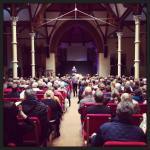
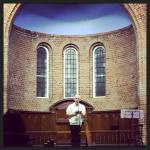
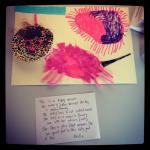
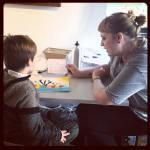
This year I decided to theme our festival around CS Lewis’ autobiography, Surprised by Joy. It’s not that I particularly love this book. It’s not even my favourite of Lewis’ works. There are some really gorgeous descriptions of the landscape around East Belfast in Surprised by Joy, and I appreciate the way he uses the text to address a number of his reasonably controversial theological outlooks, (a surprisingly openminded stance on homosexuality, a rather laisser faire attitude to church attendance and a militant dislike of pipe organs), with a frankness, sometimes absent in his later work. But, if I’m honest I was more drawn to the idea of being surprised by joy than the book itself. The world seems so screwed up right now I found the notion that we could still find ourselves unsettled, in the very best sense, by joy, or goodness, truth, beauty, kindness or anything even remotely positive, seemed incredibly appealing. I wrote Surprised by Joy across all our promotional material and tried to programme events which might allow people to connect with art and ideas in a way which would lift them beyond the everyday plod of a dark and drizzly East Belfast winter. I thought being surprised by joy meant that people might smile a bit more than usual, laugh even, or feel warm and fuzzy inside. I now realise I hadn’t read the book properly.
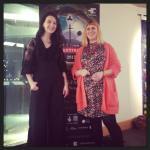
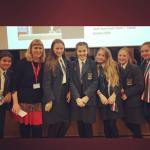

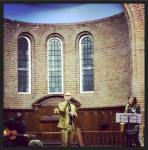
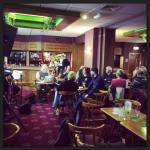
CS Lewis’ concept of joy is not the shiny, fizzy, quickly fading sensation we now seem to associate with the feeling of joy. His idea of joy is a slow burn of a feeling, perhaps better expressed as contentment or satisfaction: a sense of all things being well both within and without. Lewis is quick to point out that joy is not the same as happiness or pleasure, both of which are very temporal sensations, easily affected by a change in circumstances. “All Joy reminds,” he writes. “It is never a possession, always a desire for something longer ago or further away or still ‘about to be'” I particularly like this idea of joy being rooted into a kind of living nostalgia, and yet also something which seeks to bring order and rightness to our future being. Perhaps, in Lewis’ terms joy could be seen as a recovery of something -creativity, community, relationship, compassion- which we inherently know to be the right way of being. Such an understanding of joy would as Lewis writes, “ensure that anyone who has experienced it will want it again.”
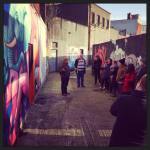
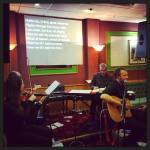
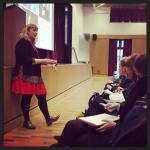
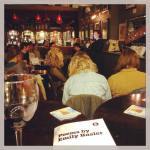
And so, I’m not particularly tired tonight. I’m enthused about what I’ve experienced over the last five days. I laughed a lot. I saw a lot of other people laughing and smiling and experiencing a wee dose of that fizzy temporal kind of joy, which isn’t a bad thing in and of itself. But I also witnessed an awful lot of the real, slow-burning joy CS Lewis seemed so fond of. I wrote stories with little kids whose imagination has not yet been tempered by reality and I, once again, saw the way this can melt even the most hardened adult head and remind them how it feels to be unconstrained. I listened to some incredible poetry, stories and music and was reminded that though there is no such thing as a right way of ordering a sentence or melody, there is something in every artist bent towards bringing beauty and meaning into the world. It’s both a pleasure and a constant incentive to be surrounded by so many people who are bent in a similar fashion. I sat party to gracious and honest conversations between people who think differently from each other and yet remain committed to dialogue rather than cold shoulders and it felt like an encouragement to keep wrestling with my own uncertainties. Finally, and perhaps most importantly I saw neighbourhood and community blossoming all round me: parents connecting over Pritt sticked masterpieces, people attending events and realising there are other people out there with the same weird, niche interests as them, complete strangers partnering up to dance rounds at the Ceilidh because they understand what it means to practice hospitality, beer and hymn singing in the Harland and Wolff staff workers club, which was so many kinds of odd, it couldn’t have been anything but glorious.
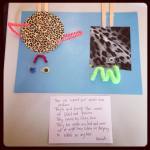
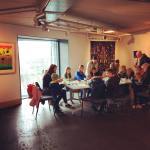
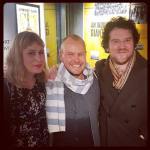
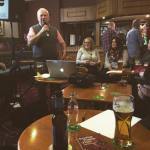
An awful lot of incidents of people being surprised by joy. All sorts of tiny miracles. Or maybe miracles is too strong a word. Because I don’t for a minute think there should be anything strange or startling about community and tolerance and creativity and dialogue. This is the way it’s meant to be all the time. This is how it could be if we had enormous reserves of funds and energy to run festivals 365 days a year OR we just all got over ourselves and didn’t require a once a year excuse to be as strange and marvellous and kind as we actually are underneath our reserve. I think this is probably what CS Lewis was getting at when he tried to define joy. It’s not really surprising at all, but it is definitely addictive.
